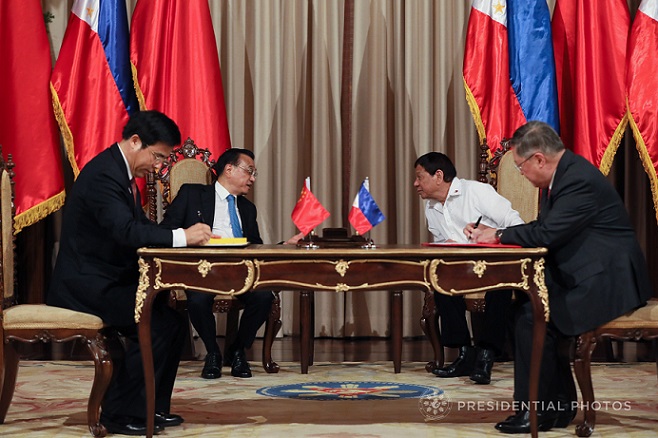
The Philippines’ major shift in foreign policy which is to talk with China bilaterally on the territorial dispute over Scarborough shoal has gotten affirmation from ASEAN with the adoption of the Framework of the Code of Conduct for the South China Sea in last’s weeks ASEAN summit.
“We discussed the matters relating to the South China Sea and took note of the improving relations between ASEAN and China and, in this regard, are encouraged by the adoption of the framework of the Code of Conduct for the South China Sea (COC), which will facilitate the work and negotiation for the conclusion of a substantive and effective COC,” this year’s ASEAN chair, Pres. Duterte, said in a statement released two days after the end of the 31st ASEAN summit and other Related Summits Tuesday last week.
The Framework, which was finalized last August by the foreign ministers of the 10-country ASEAN and China, outlines the preamble and general provisions, the principles, basic undertakings and final clauses that will constitute the code.
The objectives of the code are to establish a rules-based framework containing a set of norms to guide the conduct of parties and promote maritime cooperation in the South China Sea; to promote mutual trust, cooperation and confidence, prevent incidents, manage incidents should they occur, and create a favorable environment for the peaceful settlement of the disputes; and to ensure maritime security and safety and freedom of navigation and over-flight.
The basic undertakings of the code based on the agreed framework will include the duty to cooperate, promotion of practical maritime cooperation, self – restraint or promotion of trust and confidence, prevention of incidents through Confidence building measures and Hotlines, and the management of incidents through establishment of hotlines.
Next year’s ASEAN chair, Singapore, will oversee the negotiations on the substance of the COC. The first meeting will be early next year in Vietnam during the 23rd ASEAN-China Joint Working Group Meeting on the Implementation of the 2002 Declaration on the Code of Conduct in the South China Sea.
Last August, after it was announced that they agreed on the Framework of the COC for South China Sea, China’s Foreign Minister Wang Yi clarified that it will not cover bilaterally- disputed areas.
That means the COC on SCS will cover only the areas in the Spratlys claimed wholly by China and partly by the Philippines, Vietnam, Malaysia and Brunei. Taiwan’s coverage of the claim is the same as China’s.
That means also that talks on Scarborough shoal – Chinese name is Huangyan Dao. Philippine name is Bajo de Masinloc and Panatag shoal will only be between China and the Philippines because no other ASEAN countries claim the shoal – which is only 124 nautical miles from the shores of Zambales in Central Luzon.
Senior Associate Justice Antonio T. Carpio, an expert on the South China Sea conflict, in a statement, said another area of conflict between the Philippines and China is the overlapping maritime claims in the West Philippine Sea outside the waters surrounding the Spratlys and Scarborough Shoal.
Carpio said other bilaterally-disputed areas in the South China Sea are the territorial claims over the Paracels between China and Vietnam; overlapping maritime claims involving China and Brunei; and the overlapping maritime claims over the northern portion of the waters surrounding Natuna Islands involving China and Indonesia;
The previous administration of Benigno Aquino III had tried hard to involve the whole ASEAN in the Scarborough dispute insisting for a multilateral approach without much success.
The position of Foreign Affairs officials then was that in a bilateral negotiation, the Philippines is no match to China with its economic and military might. Retired Ambassador Lauro Baja, Jr. however, disagrees saying in the negotiation table, both parties are equal. It depends on the quality of a country’s negotiator, he said.
The Philippines brought the issue of China’s all-encompassing nine-dash line map to the Permanent Court of Arbitration in The Hague and won almost all of the issues raised.
Carpio said “The Arbitral Award resolved only the maritime dispute between China and the Philippines. The Award is binding only between China and the Philippines, although the arbitral award, as a decision of an international tribunal, is one of the sources of international law that can be invoked by other coastal states in a separate arbitration against China.”
He added: “A bilateral negotiation between China and the Philippines on the enforcement of the Arbitral Award will be a logical step as the Award is binding only between China and the Philippines. However, this will not resolve the territorial dispute between China and the Philippines. Neither will it resolve the multilateral disputes involving China, the Philippines and other states. Nevertheless, any bilateral negotiation between China and the Philippines on the enforcement of the Arbitral Award is a positive development.”
china is great collaborator, sabi ni gloria arroyo, yeah right. china is more like great impostor imposing its will and build pinas a useless mega rehab center. walk into the place and right away, you’re accosted of bad feng shui, the corners are sharp, the color so drab, you might as well commit suicide!